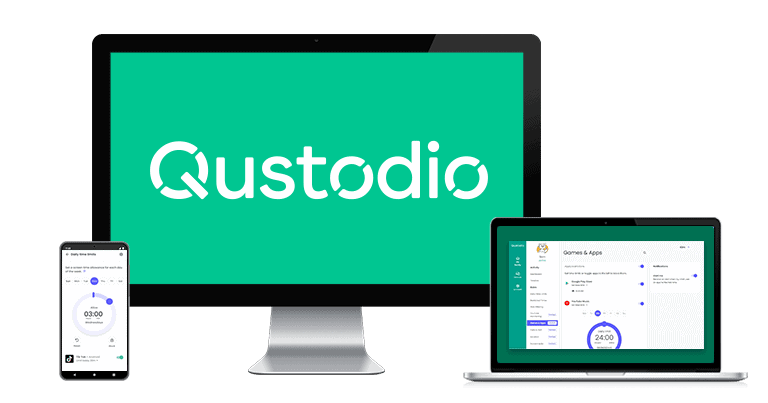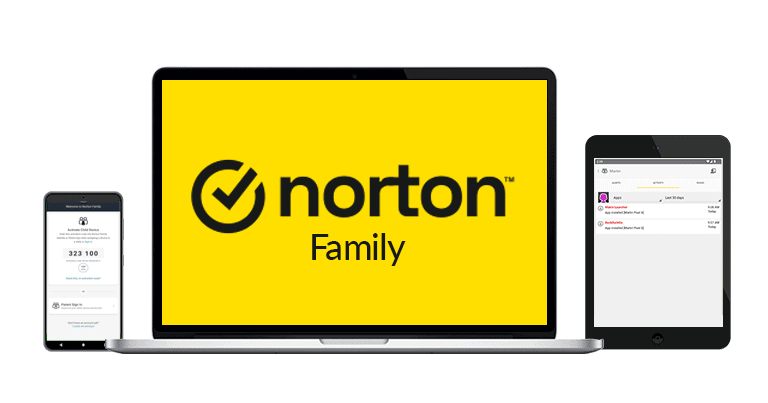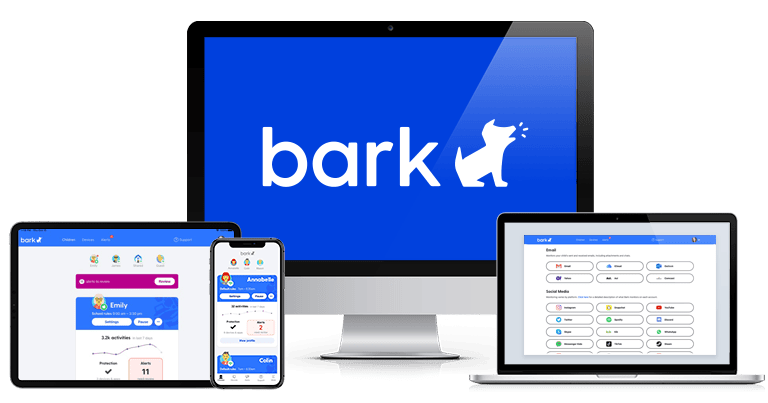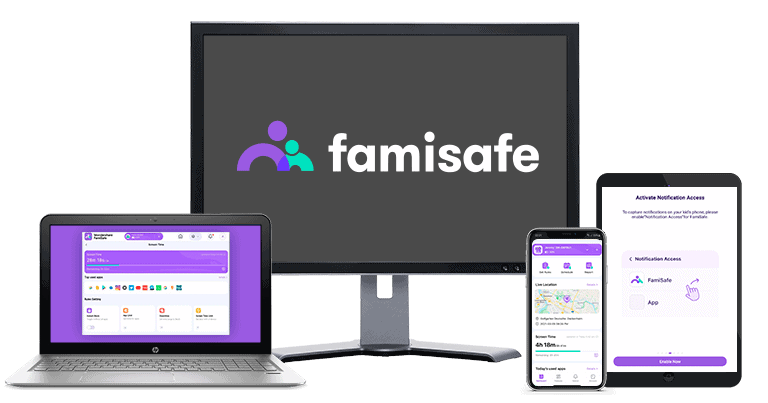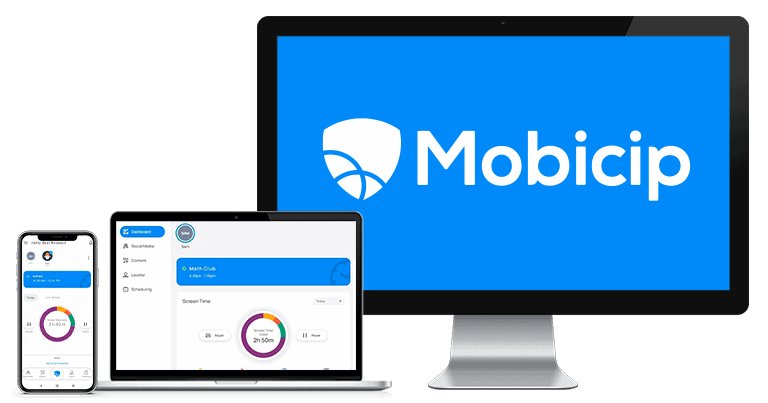
Updated on: October 15, 2024
Short on time? Here’s the best parental control app that can’t be deleted in 2024:
- 🥇 Qustodio: Qustodio has unbeatable uninstall protection alongside extensive web and app filtering capabilities. It supports a wide range of browsers and offers a good range of features, including screen time management and emergency alerts. With a 30-day money-back guarantee, it’s a risk-free choice for safeguarding your child’s online activities.
Keeping children safe online is akin to teaching them life’s essential lessons, like learning to swim or knowing when to avoid strangers. It’s a crucial part of modern parenting. Yet, the landscape of parental control apps is a bit of a maze, and tech-savvy kids can often outsmart parental control apps, leaving parents wondering how to truly protect their kids in the digital world.
But no need to worry — I’ve dedicated myself to finding the best parental control apps that even the most techy kid won’t be able to bypass. By meticulously researching and testing dozens of parental control apps, I’ve uncovered the truth behind the marketing hype. I evaluated many apps, looking at their resilience and examining how easy they were to delete or bypass with cunning tactics.
What I found was a mixed bag. Many apps made big promises, but only a few truly delivered. Some were super easy to delete, while others only scratched the surface of effective monitoring. However, there was 1 that rose above the rest — Qustodio. With a great blend of must-have features, it stands as my top pick for parents who seek genuine peace of mind.
Quick summary of the best parental controls that can’t be deleted:
- 🥇 1. Qustodio — Best overall parental control app that can’t be deleted or bypassed with a VPN.
- 🥈 2. Norton Family — Great parental control app with uninstall protection and reliable web & app filtering.
- 🥉 3. Bark — Good app for monitoring social media & text messages (+ great uninstall protection).
- 4. FamiSafe — Great for monitoring your kid’s driving habits + accurate location tracking.
- 5. Mobicip — Comprehensive time scheduling feature to control your kid’s screen time.
🥇1. Qustodio — Uncrackable Parental Control With All the Extras
Qustodio is easily the best parental control app that can’t be deleted. It’s user-friendly, rich in features, and virtually impossible to bypass, making it a safe choice for parents everywhere.
Some of Qustodio’s best features include:
- Web & app filtering — Choose which websites or apps your kids can access.
- Screen time management — Set daily or weekly limits on when your kid can use their device.
- Family locator — Know your child’s whereabouts in real time.
- YouTube & social media monitoring — See how long your kid spends on sites like YouTube and Facebook.
- Communication monitoring — See your kid’s calls and messages on iOS and Android.
- Emergency alerts — Children can instantly notify trusted contacts of their location on Android or iOS in an emergency.
- Detailed reports — Daily, weekly, or monthly reports of all activity.
Qustodio’s uninstall protection ensures it can’t be deleted without your permission. When trying to delete the kids app, I was always asked to enter the username and password of the parent app — making it impossible for my child to remove it without my input.
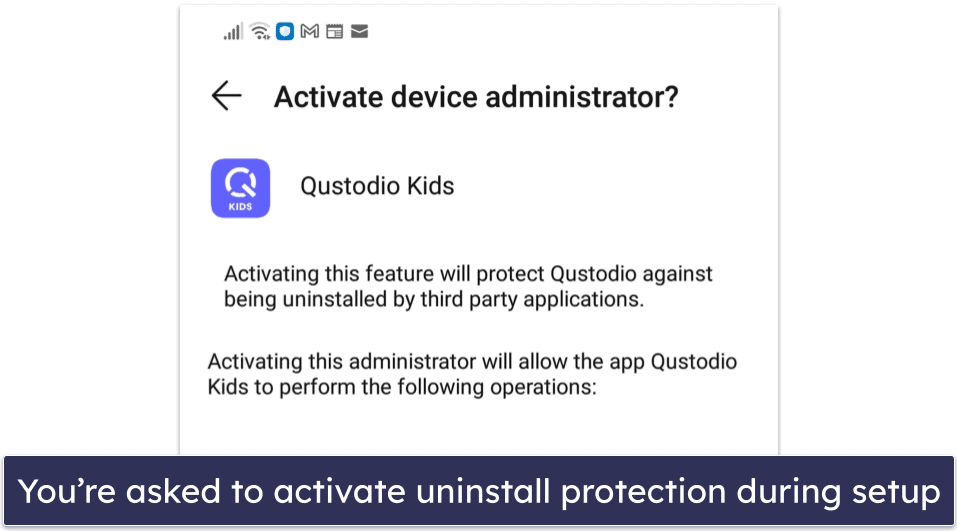
However, the protection doesn’t stop there — Qustodio’s web and app filtering proved to be a trusted ally. With it, I could handpick the websites and apps I wanted my child to have access to. The setup process was easy, with over 25 predefined website categories I could turn on or off. Add to this the ability to enforce safe searches on popular platforms like Google, and you’ve got yourself a very solid web filtering system.
I tried getting around the web filter by using incognito mode and even tested it against a VPN — but I was never able to reach any of the sites I had blocked on my child’s device.
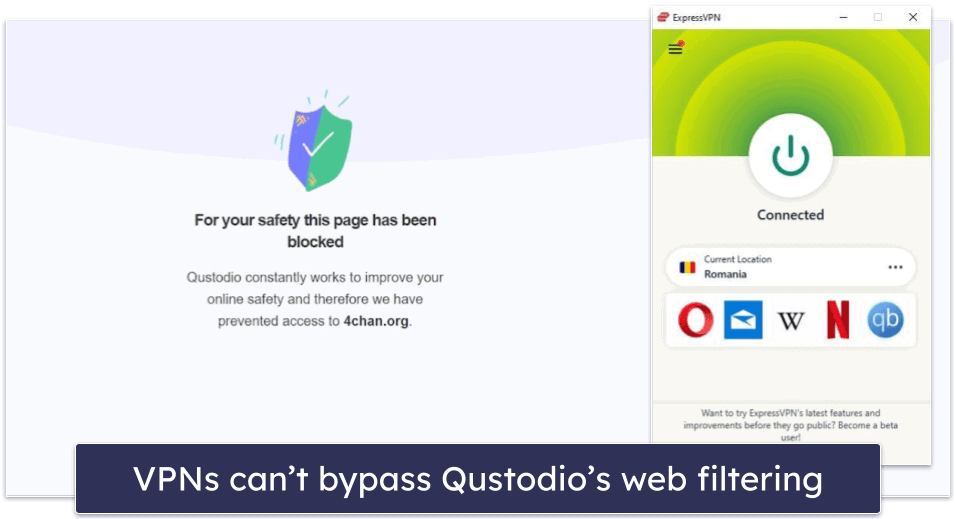
Another tactic kids will try is using an incompatible browser to access blocked sites. While Qustodio works with Chrome, Firefox, Edge, Safari, and Silk, I was impressed to see that it blocked all my attempts to open incompatible browsers like Opera and Tor.
Qustodio offers 3 plans. The free plan covers basic features for 1 device, including screen time management and web filtering. The Basic plan at $4.58 / month covers up to 5 devices with added benefits like location tracking and app blocking. The Complete plan caters to unlimited devices, includes advanced features like call monitoring and custom alerts, and costs $8.33 / month. All premium plans come with a 3-day trial and a 30-day money-back guarantee.
Bottom Line:
Qustodio is my favorite parental control app. With unbeatable uninstall protection, extensive features, and a user-centric design, Qustodio is a must-have for every concerned parent. With flexible plans and a risk-free 30-day guarantee, it’s a worthy investment in your child’s online safety.
🥈2. Norton Family — Easy Filtering With Over 45 Categories
Norton Family offers sturdy uninstall protection and reliable web and app filtering. Plus, the option of bundling it with Norton’s excellent antivirus makes it the perfect choice for those looking for a comprehensive digital guardian.
Norton Family includes many key features, such as:
- Web & app filtering — Over 45 predefined website categories to allow or block.
- Time management — Set boundaries for screen time.
- Location tracking & geofencing — Precise tracking and geofencing up to 2 miles.
- Activity reports — Insights into your child’s online habits with detailed reports.
- Additional features — Video Supervision, Search Supervision, and School Time.
The uninstall protection in Norton Family works perfectly. It requires parental account credentials to delete the app — putting it beyond the reach of clever kids.
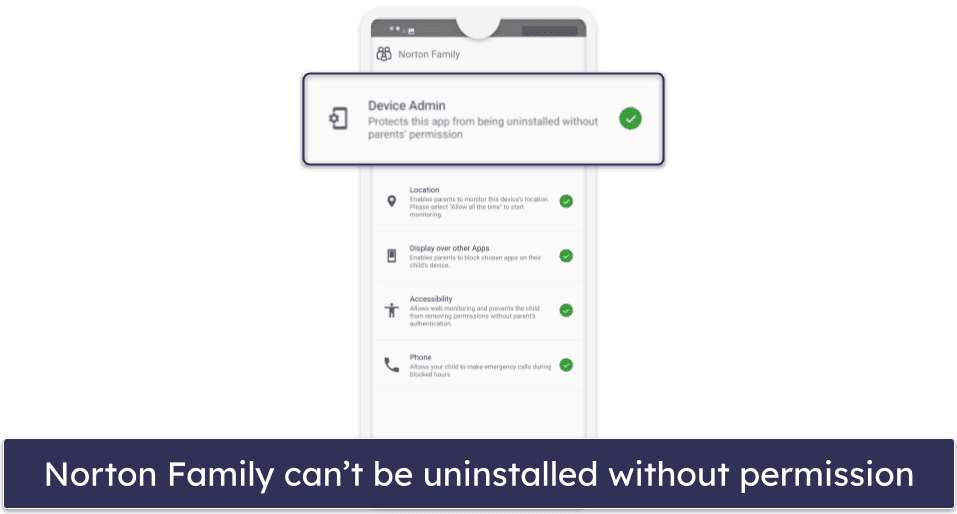
When testing Norton Family on Android and Windows devices, I was impressed by its reliability. With Chrome, Firefox, Edge, and the built-in Norton browser, the app consistently blocked access to restricted sites. However, it’s not perfect. Unlike Qustodio, Norton failed to block unsupported browsers like Brave and Opera — so I had to employ the App Supervision feature to prevent access to them, which was a little annoying. Also, note that Norton Family doesn’t work at all on macOS, so you’ll need to look elsewhere if your kid is a Mac user.
Another annoyance — a tech-savvy kid could disable the browser extension if they’re in the know. But at least Norton’s real-time alerts mean that you’ll get pinged the moment that happens.
Shifting gears to VPNs, I tested Norton Family with well-known VPNs like ExpressVPN and Private Internet Access, and it passed with flying colors — successfully blocking all restricted sites despite having a VPN switched on.
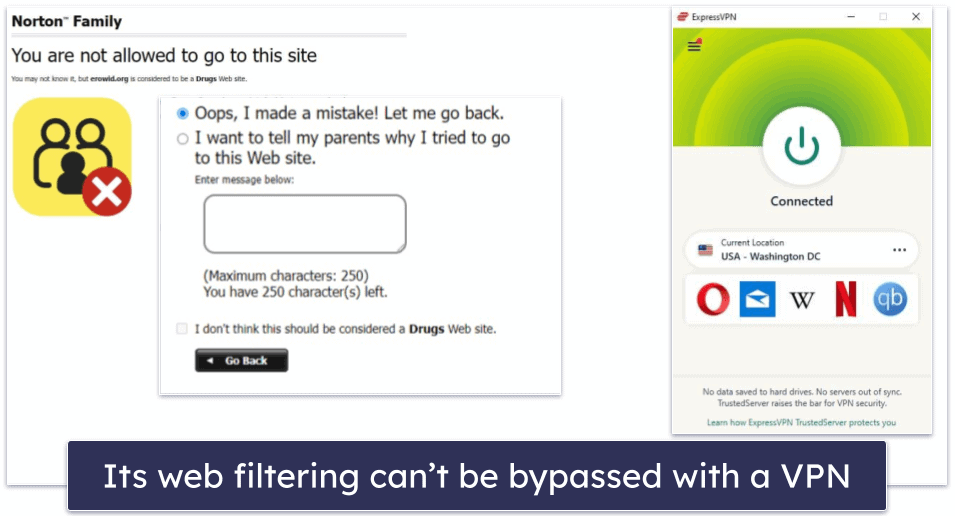
The app filtering is good, too, and covers popular apps like YouTube, Instagram, and TikTok. That said, I’d like to see Norton add the ability to set specific time limits on app usage or monitor messages on social media platforms like Qustodio has.
Norton Family offers a standalone subscription at $49.99 / year, but for a similar price ($49.99 / year*), Norton’s 360 Deluxe gives you Norton Family plus the best antivirus on the market, a top-notch VPN, and an excellent password manager. All plans are backed by a generous 60-day money-back guarantee.
Bottom Line:
Norton Family is a top contender in the parental control arena. With impenetrable uninstall protection, diverse features, and an intuitive design, it’s a reliable choice for parents seeking a comprehensive digital safety net. The bundled plans and extended money-back guarantee only further cement its place as a prime choice.
Read the full Norton Family review
🥉3. Bark — Trust-Based Social Media Monitoring
Bark is another good parental control app with uninstall protection features. It focuses on alerting parents to potential issues while preserving a child’s privacy, making it an ideal choice for families with teens or older kids who already understand the basics of online safety.
To ensure it can’t be deleted, Bark has uninstall protection for Android and Kindle Fire users. iOS users, on the other hand, can make use of Apple’s Screen Time settings to prevent the app from being removed.
Like Qustodio and Norton, Bark includes a good range of features:
- Trust-based monitoring — Avoid invasive spying and only receive alerts when Bark detects suspicious activity.
- Comprehensive social media scanning — Scans 30+ social media platforms for 15+ types of concerning behaviors.
- Customizable alert sensitivity — Tailor the alert system according to each child’s maturity level.
- Location tracking & geofencing — Real-time location tracking with customizable zones.

Bark’s standout feature is its advanced social media monitoring. Using machine learning algorithms, it scans 30+ social media platforms at the account level, alerting parents to potential issues from bullying to risky site usage. Because the app works at the account level, it won’t matter what device your child uses to access their social media account — it even works if they somehow uninstall the Bark extension, so long as you’ve connected their social media accounts via the Bark dashboard.
Where Bark lags is in its inability to impose strict time limits on specific apps, a feature competitors like Qustodio offer. Moreover, while Bark can manage content on Android seamlessly, its iOS capabilities require a connected desktop for content scans, making it less convenient for Apple-centric households.

Bark offers 2 main plans: Bark Jr. and Bark Premium, both covering an unlimited number of devices. Bark Jr. costs $60.00 / year and offers the basics like web filtering and location tracking, while Bark Premium at $14.00 / month adds content monitoring. There’s also a Bark Home device that connects to your Wi-Fi for home network monitoring, and even a Bark Phone with built-in controls for a comprehensive package.
Bottom Line:
Bark offers a unique blend of advanced monitoring and trust-based parenting. Its social media tracking is particularly impressive, but it does leave room for improvement in areas like screen time management. For parents who value a balanced approach, combining technological oversight with open family dialogues, Bark is a good option.
4. FamiSafe — Driving Reports and Real-Time Location Updates
FamiSafe offers uninstall protections and a comprehensive suite of parental control features enhanced by unique additions like drive monitoring.
FamiSafe is designed so it can’t be deleted without a challenge — if a child attempts to remove the app, they’re prompted to enter a password or 4-digit PIN. Additionally, it requires administrative privileges on mobile devices, making it more challenging to remove than standard apps. And even if successfully uninstalled, you’ll receive an immediate notification.
Other key FamiSafe features include:
- Screen time & app monitoring — Effective time management tools.
- Emergency locate — Reverse location tracking allows kids to find you in emergencies.
- Call & message monitoring — See who your kid talks to, block contacts, and read their text message conversations.
- Screen Viewer — Takes screenshots of your child’s screen at preset intervals (between 5 and 20 minutes).
- Social App Detection — Monitors 10+ social media apps for inappropriate content across 15+ categories.
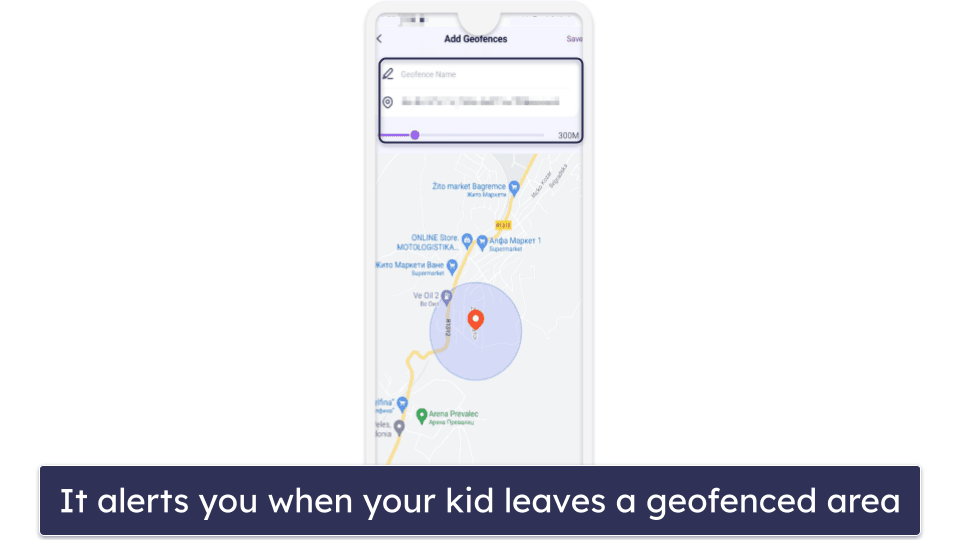
FamiSafe has good location tracking and geofencing, providing real-time updates on your child’s whereabouts. The adjustable geofencing feature allows you to set boundaries between 328 and 3,280 feet.
Another standout feature is FamiSafe’s driving reports. These reports offer in-depth insights into various aspects of driving behavior, such as the highest speeds reached, instances of hard braking, and overall driving time.

However, the app falls short in web filtering compared to Norton Family‘s 45+ predefined site categories. What’s more, despite FamiSafe’s claims of TikTok and YouTube monitoring, these features were ineffective in my tests.
FamiSafe offers 3 paid plans. You can choose between paying $9.99 / month for the monthly plan, $19.99 for the quarterly plan, or $59.99 / year for the annual plan. The monthly plan covers 5 devices, the quarterly plan 10 devices, and the annual plan an unlimited number of devices.
Bottom Line:
FamiSafe is a feature-rich parental control app that offers excellent location tracking and drive monitoring, as well as extras like call & messages monitoring and social media monitoring. However, its limited web filtering and app monitoring means it might not be the first choice for those seeking an all-encompassing parental control solution.
5. Mobicip — Best for Detailed Time Scheduling
Mobicip is a feature-rich parental control tool designed to help parents maintain oversight over their children’s online activities. Besides having good uninstall protection, I really liked how granular I could get with scheduling screen time.
It has some other really good features, too, including:
- Web and app filtering.
- Location tracking.
- Activity reports.
- Social media monitoring.
Uninstall protection ensures that kids on Android and iOS can’t uninstall the app without their parent’s credentials. On Mac and Windows though, you need to make sure your kids don’t have admin privileges or they’ll be able to uninstall it.
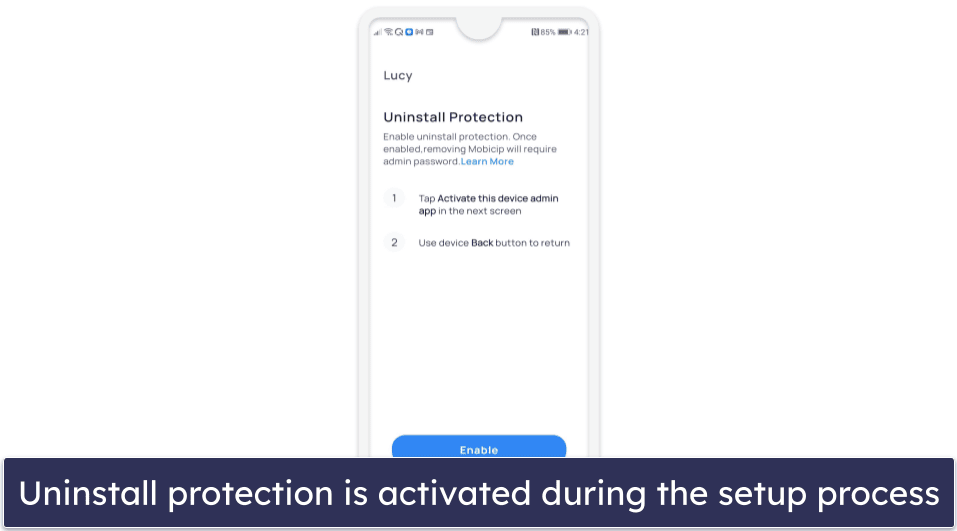
When I tested Mobicip in incognito mode, I was glad to see that sites were still being blocked according to my instructions — and when I tried using a VPN the app simply blocked the connection.
Mobicip provides precise scheduling, enabling app and web restrictions in 5-minute intervals. Outside of these schedules, kids have a daily “free time” limit, adjustable in 15-minute chunks. When this is exhausted, only emergency calls are allowed. I liked the “Vacation Mode,” too — which lets you relax the limits for holidays or breaks.
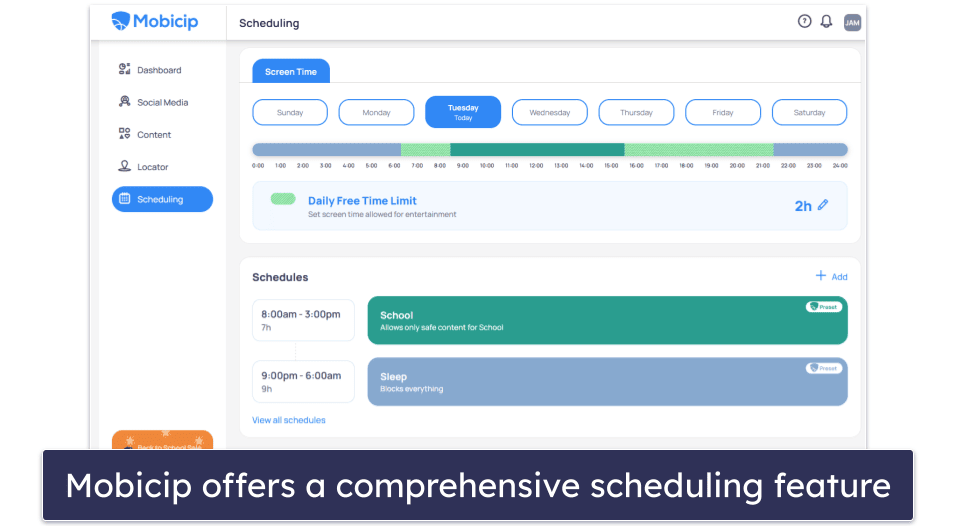
Mobicip also excels in web filtering, efficiently managing content across various browsers — even in incognito mode. While its predefined filtering categories aren’t as extensive as Qustodio or Norton Family, it compensates with keyword-based filters. App management shines on Android, but there’s room for improvement on iOS.
Mobicip Lite ($2.99 / month) and Standard ($4.99 / month) cover web and app filtering, screen time limits, and family location — for 5 devices on the Lite plan and 10 on Standard. The Premium plan at $7.19 / month can monitor up to 20 devices and allows for social media monitoring.
Bottom Line:
Mobicip’s strong uninstall protection and advanced scheduling earn its place on this list. If you’re considering the Premium plan, it might be worth weighing it against other premium options, but with a 7-day free trial and a 30-day money-back guarantee, you’ve got some room to explore.
Quick Comparison Table
How to Choose the Best Parental Controls That Can’t Be Deleted in 2024
- Evaluate the app’s uninstall protection. Stopping kids from bypassing the parental control app is crucial. Test how secure each product’s uninstall protection is by attempting to remove the software without proper credentials before letting your kid use the device. All of the options on this list have good uninstall protection.
- Examine web and app filtering capabilities. Effective filtering is essential for keeping children safe online. Try browsing restricted websites and accessing blocked apps to see how each software responds. Qustodio and Norton Family offer extensive filtering options.
- Confirm resistance against VPN usage and incognito mode. Top-tier parental control software should remain effective even if children try using VPNs or proxies to circumvent restrictions. Also, make sure to check that the app continues monitoring and restricting access even when browsing privately or in incognito mode. Qustodio performed the best in this regard.
- Assess the screen time management. This feature should be intuitive and versatile. Experiment with setting up various screen time schedules and limits to gauge each product’s efficiency and user-friendliness.
- Look for apps with good social media monitoring. With the rise of social media, it’s essential to monitor children’s activities on these platforms. Try linking to various social media accounts to see how each software detects inappropriate content. Bark, for example, can monitor over 30 social media platforms.
Top Brands That Didn’t Make the Cut
- Eyezy. Eyezy has comprehensive monitoring capabilities, from location tracking to social media scrutiny. However, it didn’t make the list because it operates more as a surveillance tool than a dedicated parental control solution. It lacks key features like screen time scheduling and broad device compatibility, and its setup process requires risky actions like jailbreaking or rooting your child’s device.
- mSpy. mSpy has deep surveillance features offering parents detailed insights into messages and social media interactions. Unfortunately, mSpy lacks any uninstall protection, and the absence of app usage limits was also an issue for me.
- MMGuardian. MMGuardian doesn’t have a geofencing feature, it’s unable to monitor YouTube activity (like Qustodio can), and it can’t set daily device usage limits (like most of our top parental control apps).
Frequently Asked Questions
What does “uninstall protection” mean in parental control apps?
Uninstall protection is a security feature in parental control apps like Qustodio that ensures the app can’t be deleted without a specific password or authorization. This stops children or unauthorized users from deleting the app to bypass restrictions. With this feature, parents can have peace of mind knowing that the protective measures they’ve set up remain consistently in place, ensuring their child’s safety online.
Do all parental control apps offer uninstall protection?
No, not all parental control apps have uninstall protection. While it’s becoming a standard feature in many top-tier apps, some still lack this security measure. When selecting a parental control app, it’s essential to review its features or check product descriptions to confirm that uninstall protection is included. For maximum safety, I recommend choosing apps that incorporate this feature.
Does using incognito mode or private browsing bypass parental control app restrictions?
Incognito mode or private browsing prevents the storage of browsing history, cookies, and site data on the device, but it doesn’t inherently bypass parental control apps. Most top-tier parental controls like Qustodio can still monitor or restrict internet access even when a child uses incognito mode. However, parents should confirm this capability when selecting an app, as not all parental control tools can effectively track or restrict incognito browsing.
Can a VPN be used to bypass web and app filtering in parental control apps?
A VPN is designed to encrypt internet traffic and change your IP address, so you can use it to bypass the web and app filtering features of some parental control apps. When the VPN masks the device’s location and online activities, certain parental control apps might struggle to enforce their filtering rules. However, top-tier solutions like Qustodio and Norton Family are designed to detect and block VPN usage or remain effective in spite of it. Parents should ensure their chosen parental control app is resilient against VPN bypass attempts to guarantee the safety of their child’s online activities.
